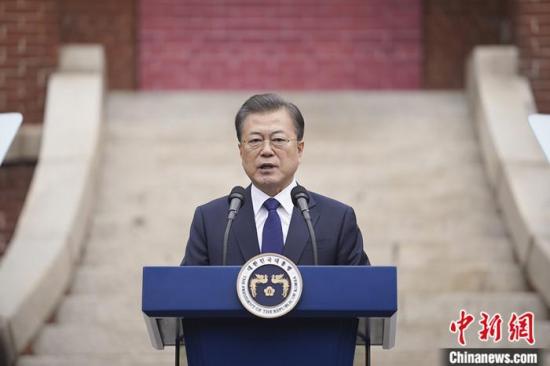China News Service, Jan. 19, reported that South Korean President Moon Jae-in held a New Year's press conference at the Blue House on the 18th to release a positive signal when he talked about the forced labor issue that worsened relations between South Korea and Japan.
In this regard, the Japanese government stated that it would pay attention to Moon Jae-in's speech, but at the same time believed that South Korea had not taken sufficient measures to improve relations between the two countries.
According to Korean media reports, Moon Jae-in said on the 18th that the forced implementation of the assets of Japanese companies into cash is not conducive to relations between South Korea and Japan.
Before that, we must first find a diplomatic solution.
Data map: South Korean President Moon Jae-in.
Photo courtesy of the Blue House
He further explained that the diplomatic solution requires the plaintiff's consent.
The governments of South Korea and Japan first reached an agreement, and then South Korea tried its best to convince the plaintiff that in this way, the problem can be solved step by step.
On the other hand, according to Kyodo News, Japan’s Deputy Chief Cabinet Secretary Sakai Xue said at a press conference that day that he would pay attention to Moon Jae-in’s speech and also observe the future actions of South Korea.
Regarding Japan-South Korea relations, Sakai pointed out: "Each other is important neighboring countries, but they are facing very severe conditions." Sakai said that in order to improve relations, "The South Korean side will also be strongly requested to take appropriate response measures in the future, and will consider all options and resolutely respond. ".
Officials from the Japanese Ministry of Foreign Affairs stated that South Korea has not taken any measures to improve Japan-South Korea relations. Without specific actions, Japan-South Korea relations cannot be improved.
In October 2018, the Supreme Court of South Korea (Supreme Court) sentenced Japan's Nippon Steel & Sumitomo Metal Corporation to compensate the four South Korean victims of forced labor during World War II 100 million won each. It was determined that South Korea and Japan signed when the normalization of diplomatic relations was restored in 1965. The agreement does not hinder the right of individual claims.
This move triggered a strong reaction from the Japanese government. The contradiction between South Korea and Japan over the issue of forced labor continued to ferment, and the tension between the two countries has increased.

